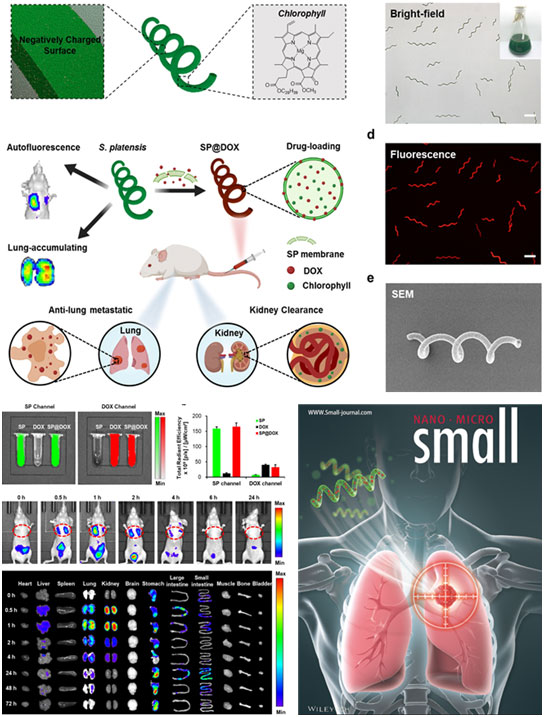Despite advanced therapies, approximately 1/3 of the patients with early-stage breast cancer will experience recurrence or metastasis, with a four-year survival rate of about 20%. Metastases in lungs are the leading cause of breast cancer deaths. Clinically, the systematic treatment of metastatic breast cancer after surgery is largely dependent on chemotherapy. However, the efficacy of this treatment is hindered by the inadequate drug delivery, where many existing therapeutic drugs cannot reach metastatic lesions. To improve the targeting potential of the anticancer drugs, nanoparticles have been extensively studied in drug loading and targeted delivery on cancer metastasis. Nevertheless, the feasibility of these nanoparticles in vivo is constrained by a suite of factors, including high production costs, technical challenges and poor metabolism. Therefore, it is highly desirable that a convenient, practical and bio-safe strategy be developed to cure metastatic breast cancer.
In this context, the research team led by ZHOU Min from the Zhejiang University Institute of Translational Medicine carried out their research into lung metastasis of breast cancer. Their research findings are published in a research article entitled “Biodegradable Microalgae-Based Carriers for Targeted Delivery and Imaging-Guided Therapy toward Lung Metastasis of Breast Cancer” in the journal of Small.

Spirulina platensis(S. platensis) is well-equipped with injectable therapeutic ingredients, such as phycocyanin, carotenoids, and polysaccharides. More importantly, S. platensis (SP) is found to be biodegradable in physiological environments, suggesting that it is practical and bio-safe in biomedical applications. SP with a negatively charged surface is likely to load positively charged molecular cargos through electrostatic adsorption. Moreover, continuous aqueous channels and junctional pores (14–16 nm) on the SP cell membrane allow small molecules enter the cell envelope, such as fluorescein isothiocyanate. The inherent chlorophyll in SP possesses the character of fluorescence that can be noninvasively tracked in vivo without any additional fluorescent markers. It is hypothesized that micrometer-sized SP may be easily trapped by pulmonary capillaries to passively target to the lungs, and its helical structure marked by flexible mobility and rotation will facilitate targeted delivery in complex environments.
ZHOU Min et al. constructed a drug-loaded system for targeted delivery and fluorescence imaging-guided chemotherapy on lung metastasis of breast cancer by using SP as natural carriers. The chemotherapeutic doxorubicin (DOX) can be easily loaded into SP to fabricate the DOX-loaded SP (SP@DOX), which is featured by ultrahigh drug loading efficiency and PH-responsive drug sustained release. The rich chlorophyll endows SP@DOX with a remarkable fluorescence imaging capacity for noninvasive tracking and real-time monitoring in vivo. Moreover, the micrometer-sized and spiral-shaped SP carriers enable the as-prepared SP@DOX to passively target the lungs and result in a significantly enhanced therapeutic efficacy on lung metastasis of 4T1 breast cancer. The undelivered carriers can finally be biodegraded through renal clearance without notable toxicity.
This research presents a novel strategy that has not yet been observed in other lung metastasis treatments, including i) the use of natural, biomedical, and abundant microalgae as drug carriers; ii) one-step fabrication which does not require any special synthesis condition or any additional reagent; iii) good biosafety and biodegradable capacity without causing undesired side effects. All these merits make SP@DOX a promising micro-platform for lung-targeted delivery and fluorescence imaging-guided chemotherapy on cancer metastasis.